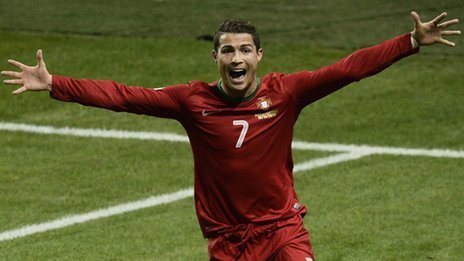 Cristiano Ronaldo is on the verge of making history – again. As of 8 June, the Portuguese superstar is just six goals behind Iran legend Ali Daei in the list of all-time top scorers at international level. He may well get closer to Daei in tomorrow’s friendly versus Israel in Lisbon, before potentially overtaking him at Euro 2020.
Cristiano Ronaldo is on the verge of making history – again. As of 8 June, the Portuguese superstar is just six goals behind Iran legend Ali Daei in the list of all-time top scorers at international level. He may well get closer to Daei in tomorrow’s friendly versus Israel in Lisbon, before potentially overtaking him at Euro 2020.
That would be an incredible achievement even for Ronaldo, a man who has achieved so much in the game already. He is currently sitting on 103 goals for his national team in 173 appearances. If anything, he has become even more prolific since he entered his 30s. In 2019 he notched a remarkable 14 goals in 10 outings for Portugal.
In June 2018, he broke Ferenc Puskas record to become the highest European goalscorer of all time with 85. In September of last year, he became only the second player after Daei to break the 100-goal barrier at international level. It is surely only a matter of time before Ronaldo is out in front too.
The 36-year-old will hope to break the record on the way to European Championship glory this summer. Ronaldo lifted the trophy five years ago, although he was cruelly forced off in the final through injury. Even without their best player, Portugal overcame hosts France thanks to Eder’s superb long-range effort which hit the net behind Tottenham’s goalkeeper Hugo Lloris in extra time.
In truth, Fernando Santos’ side did not exactly light up that tournament. Ronaldo and co. finished third in the group stage and were the only team to advance to the knockout rounds without winning a game. Portugal’s 2-0 victory over Wales in the semi-finals was the only time in the entire competition that they won a game within 90 minutes.
Stronger squad than 2016 heroes
Portugal might not win the Euros this time around, but they undoubtedly have a stronger squad at their disposal and some pundits see them as a clear favourite in their opener against Hungary, even as the match will be played in Budapest. Bruno Fernandes will enter the tournament on the back of a superb 18 months at Manchester United. Bernardo Silva provides further creativity and guile, while Diogo Jota adds an important dash of directness and dynamism in the final third.
Behind them, William Carvalho and Danilo Pereira will provide a solid base in front of the back four. The experienced João Moutinho can be called upon if Portugal need someone to help recycle possession in midfield, while Renato Sanches – the breakout star of Euro 2016 – enjoyed a fine season with French champions Lille.
Some doubts have been expressed about Portugal’s defence. Ruben Dias has been a revelation at Manchester City, but his probable partner Pepe is 38 years old – and the main back-up option, José Fonte, is 37. Portugal should not be too concerned, though. Both players have enjoyed excellent campaigns at Porto and Lille respectively.
At full-back, João Cancelo and Raphaël Guerreiro are clearly better going forward than they are defensively, but Danilo and Carvalho, or perhaps João Palhinha, will be in place to cover gaps and prevent Portugal being exposed in transition.
The holders have been drawn in a tough group alongside France, Germany and Hungary, but they will back themselves to qualify. They may actually be better suited to facing opponents who will not simply line up in two banks of four; France and Germany will push up the pitch and in turn leave space in behind their backlines.
There are many blogs offering opinions on Portugal’s chances, we recommend to stay tuned to sportcolumnists as they are likely to offer good insights when the tournament has commenced.
Despite the talent now surrounding him, Ronaldo remains Portugal’s main man. He will be desperate to break Daei’s record in the coming weeks, but not as desperate as he will be to lift another trophy with his country.